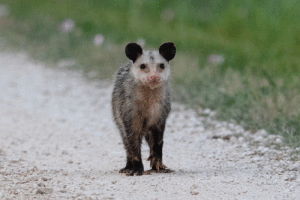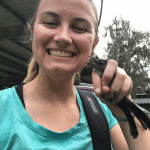
A young opossum at San Bernard National Wildlife Refuge.
The Virginia opossum is North America’s only marsupial; every other mammal on the continent is a placental mammal, meaning young develop completely inside the mother. Marsupials on the other hand, are born only partially developed, and crawl into an external pouch on the mother’s belly, where it nurses and finishes development.
Approximately 70% of marsupial species are found in Australia, including the possums, which are related to, but are not the same as, the Virginia opossum. Species like kangaroos, wombats, and Tasmanian devils are also marsupials found in Australia. The other 30% of marsupial species are found in South America.
When Virginia opossums are born, they are the size of a dime! These tiny babies remain in the mother’s pouch for two-and-a-half months before emerging, and stay with the mother until they are around five months of age. When caring for her babies, the mother opossum will carry them around on her back, an incredibly adorable sight!
Despite this cuteness, opossums have a poor reputation. Many view them as backyard pests that knock over garbage cans and dig up gardens, or as dangerous animals that lurk in your backyard. However, both of these are misconceptions.
Opossums are generalists, meaning they eat a wide variety of things, including all sorts of insects (including garden pests!), snails, and even venomous snakes! Opossums’ small size makes it unlikely for them to knock over trash cans in search of food (trash can problems are likely raccoons), although opossums will certainly eat trash if it is easily accessible.
While opossums do hold the record for most teeth of any North American mammal, and frequently show them off when cornered, they are very timid animals, and will not bite unless they feel strongly threatened.
In fact, in response to extreme threats, they will “play opossum”, or pretend to be dead for up to hours at a time, rather than fight a potential attacker. This being said, while it is incredibly unlikely, it is possible to be bitten by an opossum if they are cornered; therefore, if you encounter an opossum, make sure they have an escape route to avoid any contact.
Admittedly, appreciating the cuteness of an opossum is an acquired skill, but looks aren’t everything! A single opossum can eat up to 5,000 ticks per year, helping to curb the spread of tick-borne diseases like Lyme disease and Rocky Mountain spotted fever.
Additionally, because opossums eat venomous snakes, they are quite resistant to snake venoms. Scientists are studying this resistance in order to create more effective anti-venoms for curing snake bites. Opossums also eat carrion, helping to remove harmful bacteria from the local environment.
If you’re lucky enough to have an opossum as a neighbor, be sure to appreciate all their hard work, and be kind to them!
 Morgan Barnes is a biology intern at the Gulf Coast Bird Observatory, a non-profit organization dedicated to saving the birds and their habitats along the entire Gulf Coast and beyond into their Central and South America wintering grounds.
Morgan Barnes is a biology intern at the Gulf Coast Bird Observatory, a non-profit organization dedicated to saving the birds and their habitats along the entire Gulf Coast and beyond into their Central and South America wintering grounds.
